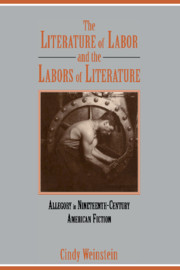 The Literature of Labor and the Labors of Literature
The Literature of Labor and the Labors of Literature Book contents
- Frontmatter
- Contents
- Acknowledgments
- Introduction
- 1 The Problem with Labor and the Promise of Leisure
- 2 Hawthorne and the Economics of Allegory
- 3 Melville's Operatives
- 4 Twain in the Man-factory
- 5 The Manikin, the Machine, and the Virgin Mary
- Afterword
- Notes
- Index
- CAMBRIDGE STUDIES IN AMERICAN LITERATURE AND CULTURE
1 - The Problem with Labor and the Promise of Leisure
Published online by Cambridge University Press: 06 July 2010
- Frontmatter
- Contents
- Acknowledgments
- Introduction
- 1 The Problem with Labor and the Promise of Leisure
- 2 Hawthorne and the Economics of Allegory
- 3 Melville's Operatives
- 4 Twain in the Man-factory
- 5 The Manikin, the Machine, and the Virgin Mary
- Afterword
- Notes
- Index
- CAMBRIDGE STUDIES IN AMERICAN LITERATURE AND CULTURE
Summary
A censorious review of Melville's Mardi appeared in the April 1849 issue of the Southern Literary Messenger: there is “an effort constantly at fine writing, [and] a sacrifice of natural ease to artificial witticism.” Melville, according to dissatisfied critics, seemed to be continuing the assault against the gentlemanly figure of the (h)auteur that Poe had launched in “The Man That Was Used Up” by foregrounding the effort that went into the act of writing. Melville's talent is here assessed according to an aesthetic that uses the discourse of work, promoting those texts which display “natural ease” while dismissing others for their constant “effort.” Thus it was not unusual to see the following kind of praise in literary reviews: “Mr. Bryant's style in these letters is an admirable model of descriptive prose. Without any appearance of labor, it is finished with an exquisite grace.” Writing was supposed to appear effortless, natural, and easy. Bryant's did and Melville's did not. Simply put, writing was not supposed to look like work, especially of the unnatural and artificial variety. We can easily understand the many critics who pronounced Mardi a colossal failure because of its lack of organization or its disconnected flights into philosophical speculation, but to frame the attack against Mardi in the language of work seems especially problematic and interesting, given the fact that one of the dominant discourses of antebellum America, namely the work ethic, championed precisely the degree of effort evidenced throughout Melville's text.
- Type
- Chapter
- Information
- The Literature of Labor and the Labors of LiteratureAllegory in Nineteenth-Century American Fiction, pp. 13 - 52Publisher: Cambridge University PressPrint publication year: 1995
